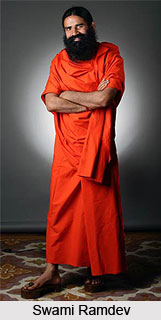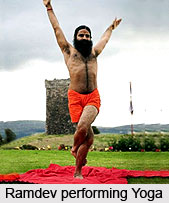 Ramdev was born in Alipur, in the Mahendragarh district of Indian state of Haryana as Ramkishan Yadav. Till the eighth grade, he attended school in Shahjadpur. Thenceforward, to study Sanskrit and Yoga, he attended a yogic monastery (gurukul) in Khanpur village. After an unspecified period of time, he gave up worldly life and entered into Sanyas (monastic living) and took the name Swami Ramdev. He went to Jind district to join the Kalva gurukul. He started offering Yoga training initially to the villagers across Haryana. It is said that before his settlement in Haridwar, he travelled the Himalayas for several years. Several medicinal plants in the Himalayas were claimed to have been discovered by him that are being used in treating his patients. With the establishment of Divya Yoga Mandir Trust along with Acharya Kraamveer, Ramdev commenced inexorable efforts to popularize Yoga in 1995.
Ramdev was born in Alipur, in the Mahendragarh district of Indian state of Haryana as Ramkishan Yadav. Till the eighth grade, he attended school in Shahjadpur. Thenceforward, to study Sanskrit and Yoga, he attended a yogic monastery (gurukul) in Khanpur village. After an unspecified period of time, he gave up worldly life and entered into Sanyas (monastic living) and took the name Swami Ramdev. He went to Jind district to join the Kalva gurukul. He started offering Yoga training initially to the villagers across Haryana. It is said that before his settlement in Haridwar, he travelled the Himalayas for several years. Several medicinal plants in the Himalayas were claimed to have been discovered by him that are being used in treating his patients. With the establishment of Divya Yoga Mandir Trust along with Acharya Kraamveer, Ramdev commenced inexorable efforts to popularize Yoga in 1995.
Teachings of Swami Ramdev
In the world health history, Ramdev is considered to be the first one, who uses freely available `Pran` (Oxygen) as a medicine. He remains successful in turns and treated thousands of grievously diseased persons who are suffering from lethal diseases like Diabetes, H.B.P., Angina, Blockages in Arteries, Obesity, Asthma, Bronchitis, Leucoderma,
 Depression, Parkinson, Insomnia, Migraine, Thyroid, Arthritis, Cervical Spondalities, Hepatitis, Chronic Renal Failure, Cancer, Cirrhosis of Liver, Gas, constipation, acidity etc.
Depression, Parkinson, Insomnia, Migraine, Thyroid, Arthritis, Cervical Spondalities, Hepatitis, Chronic Renal Failure, Cancer, Cirrhosis of Liver, Gas, constipation, acidity etc.
Curing these diseases is still reckoned to be a challenge in modern medical science. Swami Ramdev has addressed these issues with his yogic Pranayama while making "Oxygen", the medicine to treat the ailments. The presence of Yoga was always there as one of the traditional Indian remedies however Swami Ramdev was one of the leaders to redefine Yogic therapy to address medical ailments.
Traditional Indian scriptures such as `Ashtadhyayee`, `Mahabhashya` and `Upanishads` along with six systems of Indian Philosophy and their several aspects has been taught by Ramdev in various Gurukuls (traditional Indian systems of education). Gurukuls in Kishangarh, Ghashera, and Mahendragarh in India has been established with the helping hand of Ramdev. The Patanjali Yogpeeth Trust, founded by him, has built several institutions. These institutions help people to learn Yoga and spirituality and also provide a compound facility to elevate the practice of the traditional system of holistic medicine, Ayurveda, in India. Through the religious TV channel Aastha, his yoga shows are broadcasted. Zee network, Sahara One and IndiaTV also broadcasts his shows as well.









